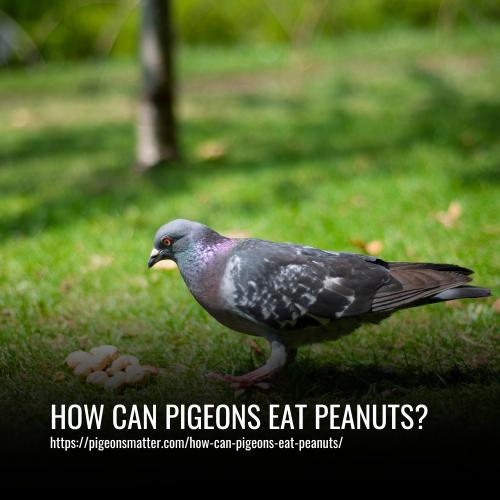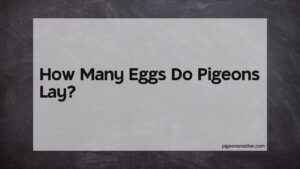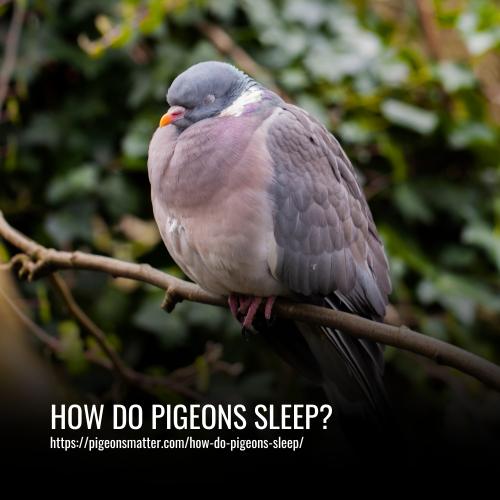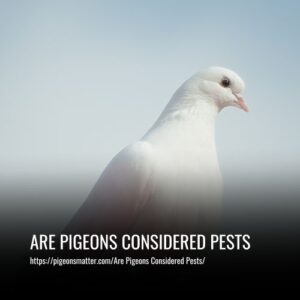Yes, pigeons can eat peanuts. Peanuts are a good source of protein, fat, and essential nutrients for pigeons. They are high in monounsaturated fats, antioxidants, and vitamins, which are beneficial for the birds’ overall health.
In the wild, pigeons naturally eat fruits, vegetables, nuts, and insects, so feeding them peanuts is a way to provide a diet that closely resembles their natural diet. This natural diet provides the necessary nutrition for their health and energy.

Is Peanut Safe for Pigeons to Consume?
Yes, peanuts are generally safe for pigeons to consume in small quantities. Pigeons are opportunistic feeders and can eat a wide variety of foods, including grains, seeds, fruits, and peanuts.
However, it is important to be mindful of the potential health concerns associated with feeding peanuts to pigeons. Peanuts are high in fat and excessive consumption can lead to weight gain, which can negatively impact their health.
Therefore, it is best to offer peanuts as an occasional treat rather than a significant portion of their diet. Additionally, there is a risk of aflatoxin contamination in peanuts, which can be harmful to pigeons if ingested in large amounts.
Benefits of Feeding Peanuts To Pigeons?
Peanuts are a good food source for pigeons because they provide essential nutrients for their overall health and well-being. Here are the main benefits of feeding peanuts to pigeons:
- Protein and Healthy Fats: Peanuts are a good source of plant-based protein and healthy fats, which are essential for tissue growth and repair, as well as maintaining healthy feathers.
- Antioxidants and Vitamins: Peanuts contain antioxidants and vitamins such as B3, B6, E, and K, which can help protect pigeons against disease and infections, and support a healthy nervous system, skin, immune system, and blood health.
- Minerals and Energy: Peanuts also provide minerals like magnesium, copper, and zinc, necessary for bone health and metabolism, as well as a source of energy to keep pigeons active and alert.
- Fiber and Injury Prevention: The fiber in peanuts can help keep pigeons’ digestive systems healthy, while the nutrients in nuts can provide valuable protein sources for muscle healing and an energy boost during flight.
Feeding peanuts in moderation and combination with a varied diet of seeds, grains, and other foods is important to ensure pigeons receive the necessary nutrients for optimal health.
The Dangers of Eating Nuts for Pigeons:
Although eating peanuts can be beneficial to pigeons, certain risks should be considered.
- Dehydration: Feeding salted nuts to pigeons can cause severe dehydration, so it’s important to only feed them raw or unsalted nuts.
- Choking Hazard: The size and type of nuts fed to pigeons can impact whether they can eat them safely. Pigeons with small or irregularly shaped beaks are at risk for choking and potential damage to their beaks.
- Alternatives to Nuts: If a pigeon has difficulty eating nuts, consider offering seeds and grains as an alternative to ensure safe meals without any risk of choking.
- Harmful Substances in Peanuts: Some varieties of peanuts contain preservatives and toxins like Aflatoxin, which can cause digestive tract infections, liver damage, and cancer in birds.
- Peanut Size Matters: Peanut size is crucial for pigeons. Large peanuts, especially classic-style peanuts, can cause choking hazards and potential damage to a pigeon’s beak. It’s better to serve pigeons with smaller, smoother Spanish peanuts or grounded classic peanuts.
- Overall Dangers: Whole nuts, not just peanuts, can pose a danger to pigeons by causing choking and potential damage to their beaks. Additionally, there is a risk of a broken wing if the bird crashes into objects while eating a nut.
What Are the Potentials Risks Associated with Feeding Peanuts to Pigeons?
Feeding peanuts to pigeons can be beneficial for their overall health and well-being, however, there are potential risks associated with it.
1. Choking Hazard:
Feeding whole peanuts or large pieces to pigeons can pose a choking hazard. Their relatively small esophagus may not be able to handle large pieces, leading to potential choking or blockage.
2. Digestive Issues:
Pigeons have a digestive system adapted to process grains and seeds, not high-fat peanuts. Overconsumption of peanuts can lead to digestive problems such as diarrhea, indigestion, or gastrointestinal blockages.
3. Obesity:
The high-fat content of peanuts can lead to obesity in pigeons. This can result in reduced mobility, decreased lifespan, and increased susceptibility to diseases.
4. Aflatoxin Contamination:
Improperly stored peanuts can be susceptible to fungal growth and aflatoxin contamination. Pigeons consuming contaminated peanuts can experience liver damage, immune system suppression, and other health issues.
5. Imbalanced Nutrition:
While peanuts provide some nutritional value, they do not offer a complete and balanced diet for pigeons. Overreliance on peanuts can result in nutritional deficiencies and health problems.
Do Pigeons Like Eating Nuts?
Yes, pigeons do enjoy eating nuts. Nuts are a natural part of many pigeons’ diets, so introducing them into your pet pigeon’s diet should not be a problem. Pigeons are opportunistic feeders and will readily munch on a variety of foods including nuts, seeds, bread crumbs, oats, rice, pasta, and more.
If you already give your pet pigeons nuts and they seem to enjoy them, great! If not, there’s no need to force them to eat it. Simply remove the ones they haven’t eaten and replace them with new ones to see if they like those better.
Pigeons usually enjoy trying new foods, so don’t worry about them not liking nuts. Just make sure to give them plenty of variety in their diet to keep them happy and satisfied.
Nutritional Value Of Peanuts For Pigeons
Peanuts are highly nutritious for pigeons, offering a high value in terms of calories, carbohydrates, fats, fiber, and protein. They also contain sodium, sugars, vitamins, and minerals. These nutrients can boost a pigeon’s flying power, providing the fuel and energy for longer and faster flights while keeping the bird hydrated.
Additionally, peanuts can improve a pigeon’s liver function and help manage its weight, leading to a healthier metabolic rate and better overall condition. Overall, the nutritional content of peanuts makes them an excellent source of energy and essential nutrients for pigeons, supporting their health and performance.
How To Feed Peanuts To Pigeons?
Feeding peanuts to pigeons can be a great way to supplement their diet and provide essential nutrients. However, it is important to ensure that the peanuts are fed safely and in moderation. Here are some tips for feeding peanuts to pigeons:
1. Peanut Feeder:
Invest in a peanut feeder designed to hold whole or shelled peanuts and protect them from moisture and pests. Hang it from a tree or place it on a post, and consider a model with a squirrel guard.
2. Ground Feeding:
If you prefer to feed on the ground, do it in a clean area and avoid overfeeding to prevent attracting rats and squirrels.
3. Hand Feeding:
Offer peanuts to pigeons by hand, holding a peanut in your flat hand and making slow movements to avoid startling the bird. Avoid overfeeding and giving too many peanuts, as they are high in fat.
4. Attracting Pigeons:
To attract pigeons, place the feeder in a visible location, add a source of water nearby, and use bird calls or pigeon decoys. Introduce peanuts properly and in smaller quantities to ensure the birds develop a taste and can digest them properly. Avoid giving peanut butter and remove any uneaten peanuts to prevent rotting.
How Much Peanuts Should Pigeons Eat?
Pigeons should consume no more than 10% to 15% of their diet in the form of peanuts. For example, if a pigeon eats about 30 grams of food daily, no more than 3 to 4.5 grams of that should be peanuts.
However, the specific amount can vary based on factors such as size, age, and overall health. It’s crucial to provide a balanced diet that includes a variety of seeds, grains, and other foods to ensure pigeons are getting all the necessary nutrients for optimal health.
Can You Feed Peanuts To Baby Pigeons?
No, you should not feed peanuts to baby pigeons. Baby pigeons, also known as squabs, are fed a secretion from adults called “pigeon milk,” which is rich in protein, fat, and carbohydrates. This secretion is produced by both parents and fed to the squabs through regurgitation.
As they grow, squabs are gradually introduced to seeds and grains as a supplement to pigeon milk. Feeding them peanuts, or any food not part of their natural diet, can be harmful. It’s important to stick to their specific diet during their development.
If you’re curious about what other foods pigeons can consume, consider checking our articles on whether pigeons eat mice and whether they eat rice for more insights. These resources offer valuable information and expert advice to help you make informed decisions about what to feed your feathered friends.
Alternative nuts you can feed pigeons:
Pigeons love nuts, and while peanuts are not actually nuts, there are many other types of nuts they can enjoy and benefit from. Some alternative nuts that pigeons can eat include sunflower seeds, acorns, almonds, beechnuts, brazil nuts, hickory nuts, macadamia nuts, pecans, pine nuts, and walnuts.
These nuts provide essential nutrients and healthy fats for pigeons, making them a great alternative to peanuts. When feeding pigeons nuts, it’s important to offer them in moderation as part of a balanced diet to ensure their overall health and well-being.
Peanut alternatives for pigeons:
Pigeons can enjoy a variety of alternatives to peanuts for a nutritious snack. Here are some options:
- Acorn.
- Almond.
- Beechnuts.
- Brazil nuts.
- Hickory nuts.
- Macadamia nuts.
- Pecans.
- Pine nuts.
- Sunflower seeds.
- Walnuts.
These alternatives can provide pigeons with essential nutrients and a tasty treat without the risk of aflatoxin contamination commonly associated with peanuts. When offering these alternatives, it’s important to ensure they are unsalted and in their natural state to avoid potential health issues for the pigeons.
Tips for Feeding Peanuts to Pigeons
When offering peanuts to pigeons, it’s important to take certain precautions. Here are some tips to keep in mind when feeding pigeons peanuts:
1. Use High-Quality Peanuts:
When feeding peanuts to pigeons, it’s important to use high-quality peanuts that are free from mold or contaminants. Choose unsalted, unflavored, and unsweetened peanuts to prevent potential health issues for the pigeons.
2. Avoid Overfeeding:
Peanuts are high in fat and should be fed to pigeons in moderation. Overfeeding can lead to obesity, which can cause health problems for the pigeons in the long run.
3. Balance Their Diet:
Pigeons should not rely solely on peanuts for nutrition. To ensure they receive a balanced diet, offer a variety of other items such as seeds, fruits, and vegetables.
4. Keep the Feeding Area Clean:
Pigeons can be untidy eaters and leftover food can attract pests and rodents. It’s important to regularly clean the feeding area to minimize potential health hazards.
5. Provide Fresh Water:
Pigeons need access to fresh water for efficient food digestion. Ensure a clean, fresh water source is available near the feeding area.
6. Avoid Feeding Pigeons in Public Areas:
Feeding pigeons in public areas can attract large flocks of birds, which can be a nuisance to others. It’s better to feed them in your backyard or designated birdwatching areas to avoid causing disturbances.
How Can Pigeons Eat Peanuts Without Getting Sick?
Pigeons can eat peanuts without getting sick because of their unique adaptations. They have a crop in their digestive system, which is a sac-like organ in their throat that stores food until they can find a safe place to eat it.
The crop allows pigeons to eat large quantities of food at once and digest it later at their leisure. It also acts as a filter, trapping any large pieces of food or foreign objects that could obstruct the digestive tract. In addition, pigeons have very strong stomach acid, which helps them to break down food quickly and kills any harmful bacteria present in the food.
These adaptations allow pigeons to safely consume peanuts, even though they are a common source of food poisoning in humans. Therefore, while peanuts can make humans sick, pigeons can eat them without any negative effects thanks to their crop and strong stomach acid.
FAQs
Yes, pigeons can eat peanuts in the shell. Their sharp beaks are capable of breaking through the peanut shells, and they can digest the whole nuts. However, young pigeons may have difficulty eating peanuts with shells.
Pigeons can eat peanut butter as it is a high-protein food for birds. It is recommended to use natural or organic peanut butter with few additives.
Pigeons can eat sunflower seeds, but too many of these high-fat, high-oil seeds can lead to an unhealthy diet for the birds.
Pigeons can eat pine nuts, which are a natural food for them and can be purchased in many stores. It is an ideal gift for pet bird owners.
Most birds, including pigeons, can eat monkey nuts. Some bird species known to take monkey nuts are pigeons, jays, magpies, rooks, and jackdaws.
Pigeons can eat raisins and many other types of fruits. It is recommended to offer fruits in small pieces for pigeons.
Pigeons, like most birds, have no problem digesting worms and other insects, so peanuts do not generally need to be washed before feeding to pigeons. However, it is important to ensure that the peanuts are not stale or moldy.
Pigeons digest peanuts by crushing them with their beaks and then swallowing them. The peanuts are then stored in their crop, which is a pouch located at the base of their throat. The crop serves as a temporary storage area where food is softened by saliva before it is passed on to the pigeon’s stomach.
Pigeons use the shells of peanuts as a source of grit. Grit is a substance that helps the bird to digest its food properly.
Conclusion
The fact that pigeons can eat peanuts without any harm may seem puzzling at first, but it’s a reminder that nature never ceases to amaze us. These resilient and adaptive creatures have evolved to take advantage of various food sources, defying our expectations along the way.
So next time you spot a pigeon munching on some peanuts, take a moment to appreciate their remarkable ability to make the most of whatever comes their way. It’s just another reminder of the incredible diversity and adaptability found in the animal kingdom.


